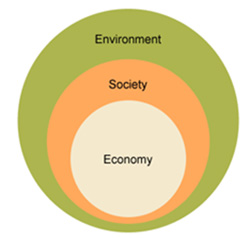“Meeting the needs of the present while safeguarding
Earth’s life-support system, on which the welfare of
current and future generations depends.”
By Dr. Nancy Manring
College of Arts & Sciences faculty are tackling the challenges of the 21st century by building interdisciplinary and team-taught courses around a new set of curricular themes.
Sustainability has become the dominant framework for understanding the challenges of the Anthropocene Era, the geological era in which humans significantly have altered the functioning of Earth’s biophysical systems. As a curricular theme, Sustainability Studies invite critical exploration of a multitude of complex issues from the local to the global levels, including resilience of social-ecological systems and social change; resource management and sustainable development; climate change; global capitalism and industrial agriculture; inter-generational equity; environmental justice, ethics and citizenship; consumption, and personal sustainability.

Figure 1: The most recent models of sustainability
portray three concentric circles to illustrate that “the stable functioning of Earth systems . . . is a prerequisite fora thriving global society” (Griggs et al., 2013, p.305).
The College of Arts & Sciences is uniquely positioned to provide the curricular foundation for Sustainability Studies. Sustainability Studies integrate knowledge from the social sciences, natural sciences and the humanities in a coherent framework that enables students to think critically about economic, social, political and cultural assumptions about humans’ relationships to the environment (see figure 1). In the face of increasingly urgent global environmental problems, Sustainability Studies engage students in multidisciplinary problem solving, reflective conversation, and critical exploration of societal values. Sustainability Studies also invite students to explore their own personal values, and envision a meaningful future in which they can thrive.
The sustainability curricular theme is a strong complement to a wide variety of majors, minors and certificates in Arts & Sciences as well as across Ohio University. The theme also will contribute to students’ post-graduation success: public and private sector organizations in the United States and across the globe increasingly are seeking individuals with collaborative, multidisciplinary problem-solving skills and a solid grasp of contemporary sustainability challenges. The theme builds on and contributes to the Common Experience Project on Sustainability, and it is enriched by the many opportunities for student involvement provided by the Office of Sustainability. In addition, the sustainability theme furthers the implementation of the Ohio University Sustainability and Climate Action Plans.
Core Faculty
The development of the Sustainability Studies theme is led by Dr. Nancy Manring (Political Science) and a Core Curriculum Group of three faculty members: Dr. Alyssa Bernstein (Philosophy), Dr. Dina Lopez (Geology) and Dr. Edna Wangui (Geography).
Theme Curriculum
The Introductory Course (under development) will be based on the concept of planetary boundaries. This framework introduces students to essential planetary systems and leads to exploration of intertwined environmental, social and economic sustainability challenges from the local to global levels. Consistent with the multidisciplinary, multifaceted nature of sustainability, students can select from a broad and diverse range of elective courses that will fulfill the Arts & Sciences breadth of knowledge requirements.
The Capstone Seminar (under development) will be focused on sustainability citizenship. Sustainability citizenship provides an inspiring lens for exploring individual and collective responsibility and choice in the context of global sustainability challenges. It also facilitates reflection about personal sustainability and incorporates community-based problem solving.
For more information contact Dr. Nancy Manring, Sustainability Studies Project Leader, at manring@ohio.edu.



















Comments